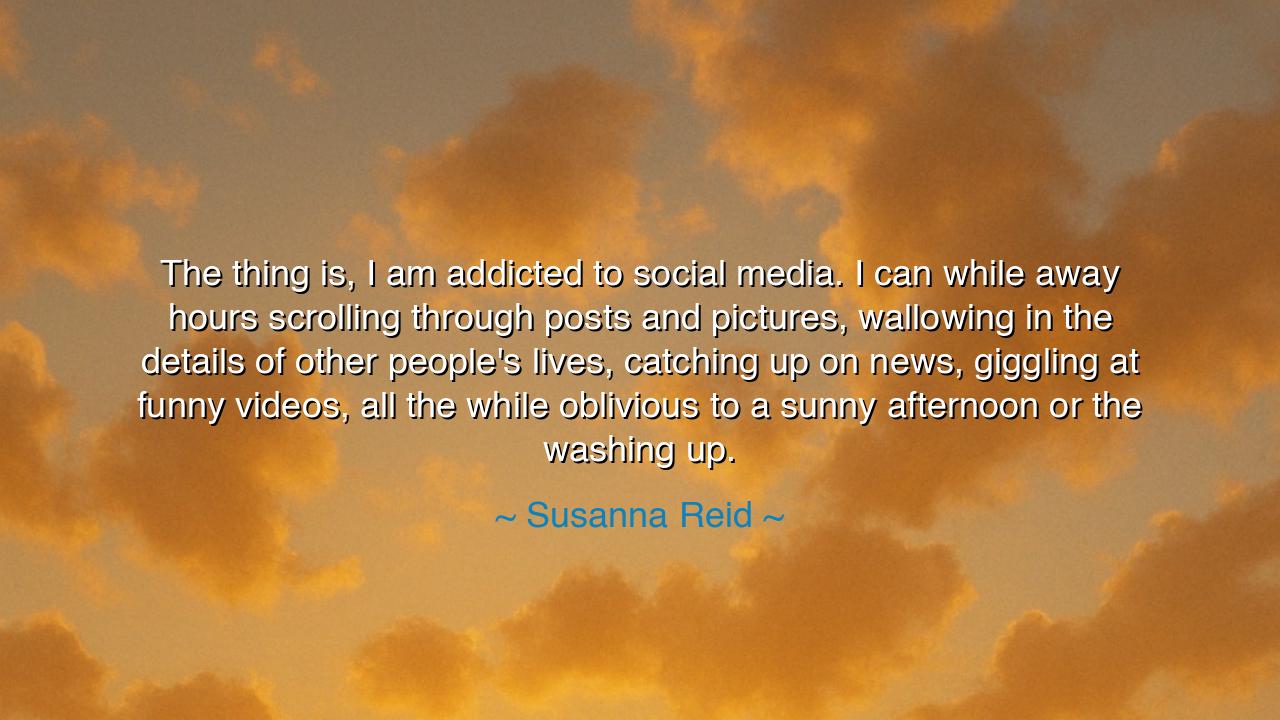
The thing is, I am addicted to social media. I can while away
The thing is, I am addicted to social media. I can while away hours scrolling through posts and pictures, wallowing in the details of other people's lives, catching up on news, giggling at funny videos, all the while oblivious to a sunny afternoon or the washing up.






When Susanna Reid confessed, “The thing is, I am addicted to social media. I can while away hours scrolling through posts and pictures, wallowing in the details of other people’s lives, catching up on news, giggling at funny videos, all the while oblivious to a sunny afternoon or the washing up,” she spoke not merely of her own habit, but of the condition of an age — the captivity of attention in a world of endless distraction. Her words echo like a lament for the modern soul: the heart that hungers for connection, yet finds itself lost in the shimmering illusions of the screen. Beneath the humor and humility of her tone lies an ancient truth — that what we give our attention to, we become.
The origin of this thought lies in the quiet honesty of self-awareness. Reid, a broadcaster and journalist, lives in the realm of constant communication — a life bound to the flicker of screens and the rhythm of headlines. Her admission of “addiction” is not an exaggeration but a confession shared by millions. The irony of her statement is profound: that in an age when humanity has gained access to the world’s knowledge, it has also lost access to its own stillness. The sunny afternoon, the washing up, the simple rituals of ordinary life — these, the ancients would say, are the small gateways to mindfulness, to presence. Yet we trade them away, one scroll at a time, for a mirage of significance.
The ancients themselves knew the perils of distraction. In the writings of Seneca, the Roman philosopher, we find the warning: “It is not that we have a short time to live, but that we waste much of it.” He spoke not of smartphones, but of the restless human mind — always looking outward, never home. What Seneca called “waste” we now call “scrolling.” Reid’s confession, then, is part of this eternal struggle — the tension between awareness and diversion, between the life that is lived and the life that is observed. She names her habit not to mock herself, but to awaken recognition in others. For her words, like all confessions of truth, carry the weight of universality.
There is a strange comfort in her description — the laughter at “funny videos,” the joy of “catching up on news.” These are not evils; they are echoes of our longing to belong. The addiction to social media is not born of vanity alone, but of the human need to see and be seen, to share in the great story of humanity. Yet therein lies the trap: what begins as connection becomes consumption, and what began as participation becomes passivity. The mind, once lively and curious, grows weary with overstimulation; the heart, once eager to feel, grows numb with comparison. Thus, the sunny afternoon fades, unnoticed, as we seek life through the reflections of others instead of living it ourselves.
History, too, offers examples of such captivity. The Roman citizens, once proud and free, became transfixed by the spectacle of the arena — gladiators and games that filled their hours, dulling their spirit. Bread and circuses, the emperors discovered, were enough to keep the people content, so long as they were distracted. So too today, the emperors of technology hold us in thrall with endless scrolls and curated pleasure. The spectacle has changed shape, but the essence remains: humanity pacified by its own distractions. Reid’s words, in their gentle candor, are a modern echo of this ancient warning.
Yet there is hope in her confession, for to recognize one’s addiction is to begin the journey toward freedom. The remedy, as the sages taught, is not rejection but reorientation — to take back one’s attention and give it to what is real. To look up from the screen and see the sunlight on the windowpane; to hear the water running as one washes the dishes; to speak to another person and truly listen. These small acts of presence are the modern equivalents of prayer. They remind us that life is not lived through observation, but through experience.
So, dear listener, let this be your lesson: guard your attention as you would your breath, for it is the essence of your being. The world will always offer new distractions — brighter, louder, more seductive — but your mind, once scattered, is slow to return. Take moments each day to set the device aside and reclaim your stillness. Step into the sunny afternoon and feel it upon your skin. Let the world be vast again, not confined to a screen. For though laughter may come from a thousand videos, peace comes only from presence — and presence, once rediscovered, is the most radiant truth of all.
And thus, Susanna Reid’s humble confession becomes a modern parable — not of shame, but of awakening. Her “addiction” is ours; her laughter, our longing. Through her words, we are reminded that the greatest gift we can offer ourselves is not entertainment, but awareness — the courage to put the screen down, lift our gaze, and remember that the world, in all its living beauty, still waits patiently for our return.






AAdministratorAdministrator
Welcome, honored guests. Please leave a comment, we will respond soon